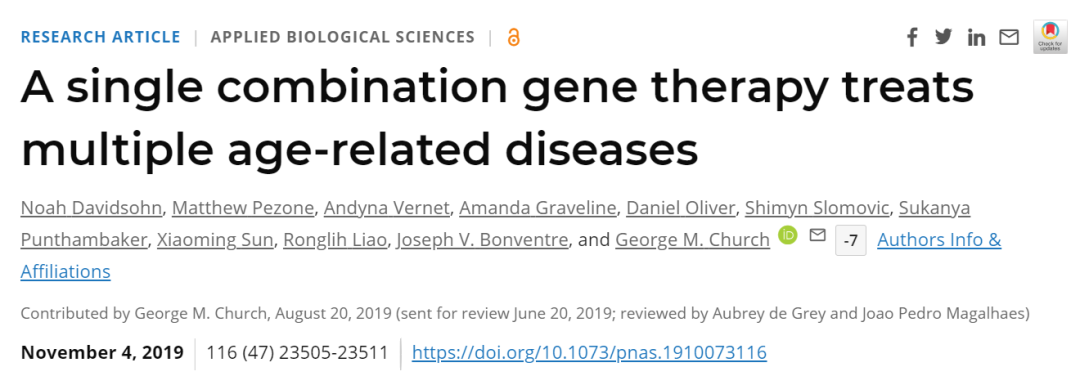预约演示
更新于:2025-05-07
RJB-02
更新于:2025-05-07
概要
基本信息
药物类型 基因疗法 |
别名 |
作用方式 调节剂 |
作用机制 TGF-β1调节剂(转化生长因子β1调节剂)、α-Klotho调节剂(klotho modulators) |
治疗领域 |
在研适应症 |
非在研适应症- |
非在研机构- |
权益机构- |
最高研发阶段临床前 |
首次获批日期- |
最高研发阶段(中国)- |
特殊审评- |
关联
100 项与 RJB-02 相关的临床结果
登录后查看更多信息
100 项与 RJB-02 相关的转化医学
登录后查看更多信息
100 项与 RJB-02 相关的专利(医药)
登录后查看更多信息
1
项与 RJB-02 相关的文献(医药)2018-05-01·Science of The Total Environment2区 · 环境科学与生态学
Remediation of arsenic in mung bean (Vigna radiata) with growth enhancement by unique arsenic-resistant bacterium Acinetobacter lwoffii
2区 · 环境科学与生态学
Article
作者: Das, Joyati ; Sarkar, Priyabrata
2
项与 RJB-02 相关的新闻(医药)2023-01-12
·生物谷
最近150年以来,人类的预期寿命得到了显著增加,然而,这些增加的寿命并非都是健康的。
当代基因组学教父、哈佛大学教授乔治·丘奇(George Church)曾表示:如果有100亿美元,就应该用来研究抗衰老【1】。
100年前,我们认为癌症和心脏病都是自然的,而如今,我们已经能够治疗甚至预防癌症和心脏病。一直以来,我们认为衰老和死亡是自然的,人类随着年纪的增长,会自然地发生衰老和死亡,然而,至今科学家们并没有找到死亡不可避免的证据,而且越来越多的研究表明,衰老能够被延缓甚至逆转。
2019年11月,乔治·丘奇团队在《美国国家科学院院刊》(PNAS)上发表了一篇题为:A single combination gene therapy treats multiple age-related diseases 的研究论文【2】。并根据这项研究成果创建了一家名为 Rejuvenate Bio 的抗衰老的公司。
在乔治·丘奇看来,一直以来,人们对疾病往往是进行单独的研究和治疗,而忽略了许多年龄相关疾病之间的相互联系,导致需要使用不相关的药物进行多次治疗,这增加了副作用的累积风险。
在这项发表在 PNAS 的研究中,乔治·丘奇尝试使用基于腺相关病毒(AAV)递送抗衰老基因的基因疗法来解决这一难题,以实现一次治疗多种年龄相关疾病。
他们选择了三个长寿相关基因——FGF21、αKlotho 和 sTGFβR2。然后使用腺相关病毒(AAV)载体来递送这些基因,将它们单独使用或组合使用,来治疗肥胖症、2型糖尿病、心力衰竭和肾衰竭这四种年龄相关疾病小鼠模型。
实验结果显示,单独或组合治疗,对不同的疾病均产生了显著的治疗效果,而更重要的是,AAV-FGF21 + AAV-sTGFβR2 的组合,能够同时治疗肥胖症、2型糖尿病、心力衰竭和肾衰竭这四种年龄相关疾病。
这项研究结果证明了使用基因疗法治疗年龄相关疾病的潜力,也证明了组合基因疗法的潜力,可以同时解决多种疾病,从而改善健康状况和寿命。
2023年1月5日,Rejuvenate Bio 公司的研究团队在预印本平台 bioRxiv 发表了题为:Gene Therapy Mediated Partial Reprogramming Extends Lifespan and Reverses Age-Related Changes in Aged Mice 的最新研究论文【3】。
衰老是一个复杂的过程,其最显著的特征是细胞过程的慢性失调,导致组织和器官功能恶化。虽然衰老目前仍无法预防,但通过旨在使这些细胞过程恢复最佳功能的干预措施,可以将其对老年人寿命和健康寿命的影响降至最低。最近的研究表明,通过过表达山中因子(OCT4、SOX2、KLF4),实现局部重编程,可以逆转年龄相关的变化。但尚不清楚这种方法能否延长野生型老龄小鼠的寿命。
研究团队对124周龄(相当于人类77岁)的野生型老年小鼠进行研究,结果显示,通过腺相关病毒9型(AAV9)系统递送山中因子(OCT4、SOX2、KLF4),相比对照组野生型老年小鼠,接受治疗的小鼠剩余寿命中位数延长了109%(对照组小鼠剩余寿命为8.86周,治疗组小鼠剩余寿命为18.5周)。总体而言,接受治疗的小鼠寿命延长了7%(对照组小鼠寿命133周,治疗组小鼠寿命142.5周)。
重要的是,该研究还观察到了接受治疗的老年小鼠的虚弱评分有了显著改善,表明这种治疗能够在延长寿命的同时改善健康寿命。此外,与未治疗组相比,接受治疗的老年小鼠的肝脏和心脏组织的甲基化水平更低,这表明其表观遗传年龄被逆转了,其遗传网络可能被重新调节到了更年轻、更健康的状态。
据悉,这是首次基于AAV的全身性基因治疗,在极度衰老的野生型小鼠中实现对剩余寿命的延长,而且同时改善了健康状态。更重要的是,整个治疗过程是安全的,没有发现任何畸胎瘤的形成。
Rejuvenate Bio 的联合创始人兼首席科学家 Noah Davidsohn 博士表示,老年人死亡的主要原因是与年龄有关的疾病,如心脏病、中风和特定的癌症。虽然衰老目前仍无法预防,但通过旨在使基因表达网络恢复最佳功能的干预措施,可以将其对生命和健康寿命的影响降至最低。这些研究结果表明,局部重编程可能是逆转衰老相关疾病的一种潜在治疗方法,并可能延长人类寿命。
随着年龄的增长,基因表达变得失调,导致体内多个器官系统和网络的协调出现崩溃。而这又反过来导致多种慢性疾病和年龄相关疾病的发生和发展,从而缩短寿命和健康寿命。而 Rejuvenate Bio 已经确定了几个具有强大安全性的长寿基因,可用于治疗这些慢性疾病。
Rejuvenate Bio 使用的是目前最具安全性的基因治疗递送载体——腺相关病毒(AAV),从而避免了递送进去的基因整合到宿主基因组中,也不会改变宿主自身基因组。此外,他们开发了新型诱导型启动子,对递送进去的基因的表达进行更精准的调控,最大程度上保证安全性。从而可以将上述确定的长寿基因作为治疗年龄相关慢性疾病的合适靶点。
值得一提的是,Rejuvenate Bio 开发的每一款疗法都可用于治疗多种疾病,这显著增加了每个疗法的价值。此外,Rejuvenate Bio 还讲这些疗法用于宠物疾病治疗,这为早期收入提供了来源,也有助于推动进一步人类临床研究。
Rejuvenate Bio 目前有三个研发管线——RJB-01、RJB-02、RJB-03。
RJB-01 和 RJB-02、基于三个长寿相关基因——FGF21、αKlotho 和 sTGFβR2。这三个基因的功能和安全性已经经过了大量验证。其中 RJB-01 是针对 FGF21 和 sTGFβR2 靶点,用于治疗人类的心血管疾病、代谢疾病、肾病。RJB-01 是针对 αKlotho 和 sTGFβR2 靶点,用于治疗人类关节疾病。RJB-03 的靶点尚未公布,用于治疗人类心血管疾病、神经疾病、肌肉疾病、代谢疾病、关节疾病。其中,RJB-01 正在准备临床试验申报。
此外,这三个研发管线同时也被用于开发针对宠物狗的基因治疗,Rejuvenate Bio 希望通过与动物健康公司 Phibro Animal Health 的合作,为进一步的人类临床研究提供早期收入来源。
乔治·丘奇曾在采访中表示,人类的寿命没有上限,但自己的目标不是让人长生不老,而是研究如何逆转衰老、治疗衰老相关疾病。现阶段自己想做的是开发出一种能治愈多种衰老相关疾病的药物并获得 FDA 批准上市。
最近150年以来,人类的预期寿命得到了显著增加,然而,这些增加的寿命并非都是健康的。对全球疾病负担数据库的分析表明,健康状况良好的人的比例大致保持不变,这意味着,随着寿命的增加,健康状况不佳的年数在不断增加。
此外,人类疾病负担正在向慢性疾病转移,这意味着很多人的生命中的相当一部分是在慢性疾病带来的虚弱或残疾中度过,直至死亡。因此,人们开始越来越重视“健康衰老”,不再一味地追求延长预期寿命,如何延长健康寿命更为重要。近年来开始涌现的抗衰老研究公司,正是这一观念的直观体现。

基因疗法临床研究临床结果
2021-10-06
Rejuvenate Bio Co-founder and CSO Noah Davidsohn/Courtesy Rejuvenate Bio
The myth of a fountain of youth has inspired explorers for centuries, but modern scientists have come closer than any to understanding the secret of long, healthy lives. As it turns out, that secret is genetic.
Today, “we think about aging as a dysregulation of genes and proteins that lead to age-related diseases, such as heart disease, obesity, diabetes, etc. When we talk about reversing aging – or, more accurately, the disease states associated with aging – we’re talking about reregulating genes back to the healthy state people had when they were younger,” Noah Davidsohn, Ph.D., co-founder and CSO of Rejuvenate Bio, told BioSpace.
Unlike most companies addressing the diseases associated with aging, Rejuvenate Bio tackles multiple cardiac, metabolic and renal issues at once. “Based on the data we’ve seen from mice and dogs, we can reverse obesity, diabetes and heart disease,” Davidsohn said.
Rejuvenate Bio has two therapies in its pipeline, RJB -01 and RJB-02, targeting the cardiac, metabolic and renal space. Both are delivered via adeno-associated viruses (AAV).
Co-founder and CEO Daniel Oliver said he expects RJB-01 to enter the clinic for humans in 2023, and also to be commercialized for animals that same year. RJB-01 targets overexpression of FGF21 and downregulation of TGFß1 via expression of sTGFßR2. Rejuvenate is developing it for heart failure. Research conducted by other companies shows that targeting these genes is also effective and safe for weight loss, diabetes and tumor inhibition.
The second therapy, RJB-02, is designed to treat osteoarthritis. It targets two genes – downregulation of TGFß1 via expression of sTGFßR2, and overexpression of αKlotho. The latter is associated with improving cognitive performance as well as protecting the heart and kidneys, and increasing insulin sensitivity.
Davidsohn and Oliver proved the concept behind this gene therapy approach with colleagues at Harvard Medical School in 2019. A PNAS paper from the time detailed the results of modulating three genes associated with longevity – fibroblast growth factor 21 (FGF21), αKlotho, and a soluble form of mouse transforming growth factor-β receptor 2 (sTGFβR2) – delivered via adeno-associated viruses. Notably, the researchers combined two therapies into one to treat four age-related conditions.
The results in mice showed “a 58% increase in heart function in ascending aortic construction ensuing heart failure, a 38% reduction in α-smooth muscle actin (αSMA) expression, and a 75% reduction in renal medullary atrophy in mice subjected to unilateral ureteral obstruction, as well as a complete reversal of obesity and diabetes phenotypes in mice fed a constant high-fat diet,” the paper noted.
“What’s particularly exciting is that in mice, we showed we could halt progression of heart disease in its tracks despite the surgical tightening of the aorta,” Davidsohn said. Similar results were seen in dogs, too.
Building on that early work, Rejuvenate Bio, which spun out of George Church’s lab at Harvard Medical School, has a study underway to treat mitral valve disease in dogs. “After one and a half years, we’ve seen no safety problems,” Oliver said, and “preliminary data suggests this therapy has the ability to treat heart failure.”
Rejuvenate Bio has a dual animal/human business strategy that enables it to capitalize on the many animal studies that are required as part of the U.S. Food and Drug Administration review process.
“It’s compelling that the same treatment goes into animals and humans,” Oliver said. “As we generate data in any of the areas, we lower the risks. Hopefully, this will allow us to go into a number of indications quickly and easily.”
Since its inception in early 2018, Rejuvenate Bio has raised approximately $27 million in funding. Of that, $18.5 million is private and venture debt. Non-dilutive funding makes up the remainder. “That lets us get to market in 2023 for animal health, and start human clinical trials,” Oliver said.
Notably, its clinical work for canine and human trials is symbiotic. The targeted animal safety clinical trials that are needed before a product can be marketed for animal health also meet the requirements for the FDA’s large animal pre-Investigational New Drug (IND) toxicology experiment. Those canine studies also enable accelerated aging studies. By evaluating tens of thousands of dogs with mitral valve disease, the research team can see the progression, halt or reversal of disease and the effects on the dog’s quality of life in ways that are more robust than in an academic setting. Therefore, Oliver said, “animal health is a huge component of this, and a huge unmet need (for canine health).”
Then, the company needs to complete an additional pre-IND package for human trials. “We’ve connected with the regulators, so we have a well-defined path in terms of what’s needed to get to human trials and to get through animal health trials,” Oliver said. “Now it’s just a question of executing on what we know we need to do.”
Currently, Rejuvenate Bio is in the process of transferring manufacturing to a third party manufacturer and is working with leading animal health providers to ink a partnership.
At the same time, Oliver and Davidsohn are fine-tuning their human clinical development plan. “We want to push past single monogenetic disorders. We’re working with Kathy High, M.D., scientific advisory board member and former head of Spark Therapeutics, on clinical development paths to get to the clinic quickly, and to attack a disease with high unmet needs, but that also has potential for larger indications in the cardiac, metabolic or renal spaces,” Oliver said.
The goal, Oliver and Davidsohn stressed, is to lengthen individuals’ healthspans – the time they are healthy and vital. “That’s a key ideological difference, Davidsohn pointed out. “The point isn’t to live longer in a state of poor health. We want all a person’s years to have positive health. Therefore, increasing one’s healthspan is very important, and it’s possible through aging reversal.”
基因疗法
100 项与 RJB-02 相关的药物交易
登录后查看更多信息
研发状态
10 条进展最快的记录, 后查看更多信息
登录
| 适应症 | 最高研发状态 | 国家/地区 | 公司 | 日期 |
|---|---|---|---|---|
| 关节疾病 | 临床前 | 美国 | - |
登录后查看更多信息
临床结果
临床结果
适应症
分期
评价
查看全部结果
| 研究 | 分期 | 人群特征 | 评价人数 | 分组 | 结果 | 评价 | 发布日期 |
|---|
No Data | |||||||
登录后查看更多信息
转化医学
使用我们的转化医学数据加速您的研究。
登录
或

药物交易
使用我们的药物交易数据加速您的研究。
登录
或

核心专利
使用我们的核心专利数据促进您的研究。
登录
或

临床分析
紧跟全球注册中心的最新临床试验。
登录
或

批准
利用最新的监管批准信息加速您的研究。
登录
或

特殊审评
只需点击几下即可了解关键药物信息。
登录
或

生物医药百科问答
全新生物医药AI Agent 覆盖科研全链路,让突破性发现快人一步
立即开始免费试用!
智慧芽新药情报库是智慧芽专为生命科学人士构建的基于AI的创新药情报平台,助您全方位提升您的研发与决策效率。
立即开始数据试用!
智慧芽新药库数据也通过智慧芽数据服务平台,以API或者数据包形式对外开放,助您更加充分利用智慧芽新药情报信息。
生物序列数据库
生物药研发创新
免费使用
化学结构数据库
小分子化药研发创新
免费使用
